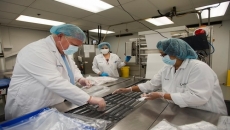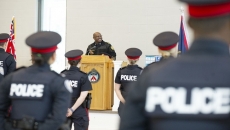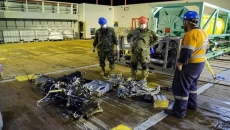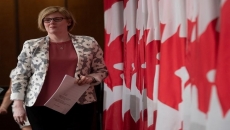Ottawa is considering outfitting Canadian police with cameras following protests against violence by some officers, but experts say there is not enough proof the expensive technology is effective.
"There is no value for money in this," said Kevin Walby, associate criminal justice professor at the University of Winnipeg who has studied the use of body-worn cameras on police.
There have been demonstrations across the country and around the world since the death of George Floyd, a Black man in Minneapolis last month. A police officer knelt on his neck for several minutes as Floyd said he couldn't breathe.
Prime Minister Justin Trudeau, who knelt with demonstrators Friday at an Ottawa anti-racism rally, said Monday that he would push premiers and RCMP to equip police with body-worn cameras. He said it was a relatively simple way to address complaints that officers in Canada treat racialized people unfairly.
Federal Public Safety Minister Bill Blair, a former Toronto police chief, said Tuesday that people are calling for accountability and transparency and cameras could enhance that.
"I know from some experience that video evidence can be the best possible evidence," Blair said.
There have been numerous pilot projects for the body cameras in police services across the country. Very few have made it standard practice.
Walby said studies in North America looking at the use of these cameras show mixed results. He added there is very little proof that use-of-force cases are significantly reduced. In some cases, Walby said police felt emboldened by the presence of the camera.
Adopting cameras in policing also comes with a significant price tag, Walby added.
"Some of the police officers in other killings of Black and Indigenous people in North America — the officers have had body cams on," he said, noting that the officers involved in the Floyd case were also wearing them.
Winnipeg Police Chief Danny Smyth threw his support behind bringing in body cameras this week but estimated it could cost up to $10 million for things such as data storage. A pilot project by the Edmonton Police Service cautioned moving forward with more cameras citing major issues with hardware and data management, as well as unexpected expenses.
Adding millions in new funds to police services is not what demonstrators have called for, Walby added.
"Why would we invest hundreds of millions of dollars into something that doesn't really work."
Protest organizers across the country shared similar sentiments about a move towards body cameras.
Jayda Hope, who co-organized a rally in Winnipeg that drew an estimated 15,000 people last week, tweeted "we don't want body cams, or to work together or compromise (with) the police ... We want abolition and defunding."
Cameras did not contribute to a significant increase in public confidence in police, said Samuel Tanner, an assistant professor of criminology at the Universite de Montreal, referencing a study he conducted recently in Montreal.
Increased transparency is also debatable, he said. When an incident is captured on the video, it isn't released publicly until a trial process. Even then, Tanner added that often the quality of image or audio is not good.
"It's not the magical solution."






